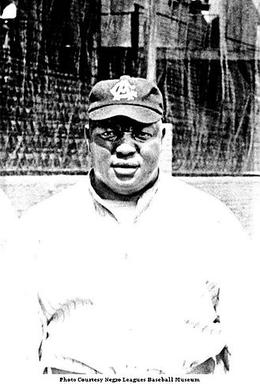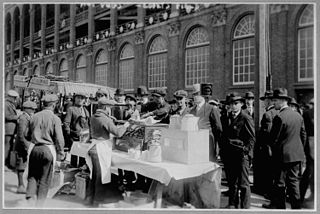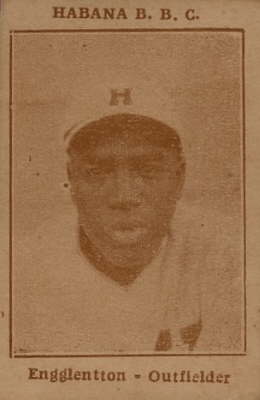Related Research Articles

Andrew "Rube" Foster was an American baseball player, manager, and executive in the Negro leagues. He was elected to the Baseball Hall of Fame in 1981.
The first Negro National League (NNL) was one of the several Negro leagues that were established during the period in the United States when organized baseball was segregated. The league was formed in 1920 with former player Rube Foster as its president.

James Allen "Candy Jim" Taylor was an American third baseman and manager in Negro league baseball. In a career that spanned forty years, he played as an infielder in the early years of the 20th century for over a dozen black baseball teams; by the mid-1920s, he would play less regularly, with his final game came at 58. In 1920, the same year of the start of the golden era of Negro league baseball, he would take on the responsibilities of manager, where he would manage 1,967 games for twelve teams. Described as one of the great strategists of his era, Taylor is the all-time winningest manager in the Negro league era, having 955 wins along with two Negro World Series titles and one additional pennant in 27 seasons as manager. He has the most seasons managed by an African American manager along with having the seventh most for a manager in the history of baseball.
The Chicago American Giants were a Chicago-based Negro league baseball team. From 1910 until the mid-1930s, the American Giants were the most dominant team in black baseball. Owned and managed from 1911 to 1926 by player-manager Andrew "Rube" Foster, they were charter members of Foster's Negro National League. The American Giants won five pennants in that league, along with another pennant in the 1932 Negro Southern League and a second-half championship in Gus Greenlee's Negro National League in 1934.

The East–West All-Star Game was an annual all-star game for Negro league baseball players. The game was the brainchild of Gus Greenlee, owner of the Pittsburgh Crawfords. In 1933 he decided to emulate the Major League Baseball All-Star Game, using Negro league players. Newspaper balloting was set up to allow the fans to choose the starting lineups for that first game, a tradition that continued through the series' end in 1962. Unlike the white All-Star game which is played near the middle of the season, the Negro All-Star game was held toward the end of the season.
The Dayton Marcos were a Negro league baseball team based from Dayton, Ohio that played during the early twentieth century.

Andrew Lewis Cooper, nicknamed "Lefty", was an American left-handed pitcher in baseball's Negro leagues. He was elected to the Baseball Hall of Fame in 2006. An alumnus of Paul Quinn College, Cooper played nine seasons for the Detroit Stars and ten seasons for the Kansas City Monarchs, and briefly played for the Chicago American Giants. The Texan was 6 feet 2 inches (188 cm) tall and weighed 220 pounds.

The following are the baseball events of the year 1920 throughout the world.

William Miller "Big Bill" Gatewood was an American Negro league baseball pitcher and manager for several years before the founding of the first Negro National League, and in its first few seasons. He pitched for the Leland Giants, Chicago Giants, St. Paul Colored Gophers, Chicago American Giants, New York Lincoln Giants, Cuban X-Giants, Philadelphia Giants, Brooklyn Royal Giants, St. Louis Giants, Indianapolis ABCs, Detroit Stars, St. Louis Stars, Toledo Tigers, Milwaukee Bears, Memphis Red Sox, Atlantic City Bacharach Giants, and Birmingham Black Barons.

Macajah Marchand "Mack" Eggleston Jr. was an American baseball catcher and outfielder in the Negro leagues. He played from 1919 to 1934 with over a dozen teams. He also served as manager of the Wilmington Potomacs in 1925.
The 1926 Colored World Series was the championship tournament for the 1926 season of Negro league baseball. It was the third overall Series played. It matched the Chicago American Giants, champions of the Negro National League (1920–1931), and the Bacharach Giants of Atlantic City, New Jersey, champions of the Eastern Colored League. Initially planned as a best-of-nine series, two ties meant that the series went eleven games. Chicago won just once in the first six games, but games 1 and 4 had ended in ties, meaning that they only trailed three games to one when the Series shifted to Chicago. They were down to their final game after losing the eighth game, but the Chicago American Giants proceeded to win the next three games to complete the comeback and win their first ever World Series.
The Memphis Red Sox were an American Negro league baseball team that was active from 1920 to 1959. Originally named the Barber College Baseball Club, the team was initially owned and operated by Arthur P. Martin, a local Memphis barber. In the late 1920s the Martin brothers, all three Memphis doctors and businessmen, purchased the Red Sox. J. B. Martin, W. S. Martin, and B. B. Martin, would retain control of the club till its dissolution in 1959. The Red Sox played as members, at various times, of the Negro Southern League, Negro National League, and Negro American League. The team was never a titan of the Negro leagues like wealthier teams in northern cities of the United States, but sound management lead to a continuous thirty-nine years of operation, a span that was exceeded by very few other teams. Following integration the team had five players that would eventually make the rosters of Major League Baseball teams and two players that were inducted into the Baseball Hall of Fame.
The Richmond Giants were an independent semi-pro Negro league baseball team based in Richmond, Indiana that fielded a team in two different seasons. Though their existence was short, several Negro league stars played for the Giants, including Bill Holland, Connie Day, Will McMurray and Hall of Famer Oscar Charleston.
The 1919 Detroit Stars baseball team competed in Negro league baseball during the 1919 baseball season. In their first year of competition, the Stars won the championship of independent western Negro league clubs. While the Seamhead website reports that the team compiled a record of 27–13, the "Game Log" below includes 44 wins based on 1919 games for which contemporaneous newspaper accounts have been located.
The 1922 Detroit Stars baseball team competed in the Negro National League during the 1922 baseball season. In games for which newspaper accounts have been found, the Stars compiled a 58–32–1 record (.643).
The 1925 Detroit Stars baseball team competed in the Negro National League during the 1925 baseball season. The team compiled a 56–44 record (.560) in games against National League opponents. The Stars played their home games at Mack Park located on the east side of Detroit, about four miles from downtown, at the southeast corner of Fairview Ave. and Mack Ave. The team was owned by John A. Roesink and managed on the field by catcher-manager Bruce Petway.

Edward Rile, nicknamed "Huck", was an American Negro league pitcher and first baseman who played for several teams from 1918 to 1936.
The 1920 Detroit Stars baseball team competed in the Negro National League (NNL) during the 1920 baseball season. The Stars compiled a 37–27 record (.578) and finished in second place in the NNL behind the Chicago American Giants.
References
- ↑ "nlbpa.com - Dayton Marcos". www.nlbpa.com. Retrieved 2021-04-21.
- 1 2 3 4 5 6 7 8 9 10 11 12 13 14 "1920 Dayton Marcos | The Calendar of The 1920 Dayton Marcos". negroleagues.bravehost.com. Retrieved 2021-04-21.
- ↑ Lowry, Philip J. (2006). Green cathedrals : the ultimate celebration of major league and Negro league ballparks. New York: Walker & Co. ISBN 0-201-62229-7. OCLC 74491309.
- ↑ "Colored Teams Battle Bravely For Piqua Fans". Piqua Daily Call . July 2, 1920.
- 1 2 "Marcos 6; Am. Giants 5". Chicago Tribune . May 17, 1920.
- ↑ "Marcos Season Opens With Win; Contest Sunday". Dayton Daily News . June 13, 1920.
- ↑ "Marcos Cop Last Game Over Giants". The Dayton Herald . June 16, 1920.
- ↑ "Steel Arm Davis - Seamheads Negro Leagues Database". www.seamheads.com. Retrieved 2021-04-21.
- ↑ "Look Here, Fans" (PDF). The Chicago Defender . July 3, 1920.
- ↑ "Ragland Wild-Marcos Lose" (PDF). Indianapolis Freeman . August 7, 1920.
- ↑ "League Standing" (PDF). The Chicago Defender . July 31, 1920.
- ↑ "Couldn't Hold The Lead" (PDF). Kansas City Star . August 8, 1920.
- ↑ "Monarchs in a 4-1 Victory". Kansas City Times . August 9, 1920.
- ↑ "American Giants Leading League" (PDF). Indianapolis Freeman . September 4, 1920.
- ↑ "Detroit Stars Win On Forfeit" (PDF). Detroit Free Press . August 22, 1920.
- ↑ "3 Runs in 11th Beat Chicago" (PDF). Chicago Defender . September 4, 1920.
- 1 2 "Marcos Lose 6 to 1". The Dayton Herald . September 16, 1920.
- ↑ "Marcos Play 'Italians Today; Title Series On". Dayton Daily News . September 19, 1920.
- ↑ "1919 Dayton Marcos - Seamheads Negro Leagues Database". www.seamheads.com. Retrieved 2021-04-22.
- ↑ "Marcos Defeat Dayton Rubbers". Dayton Daily News . September 27, 1920.
- ↑ "October 13, 1920". The Dayton Herald .
- ↑ "Federals and Marcos Ready". The Dayton Herald . October 15, 1920.
- ↑ "Marcos Close by Defeating Federals". Dayton Daily News . October 18, 1920.
- 1 2 "1920 Season- Seamheads Negro Leagues Database". www.seamheads.com. Retrieved 2021-04-21.